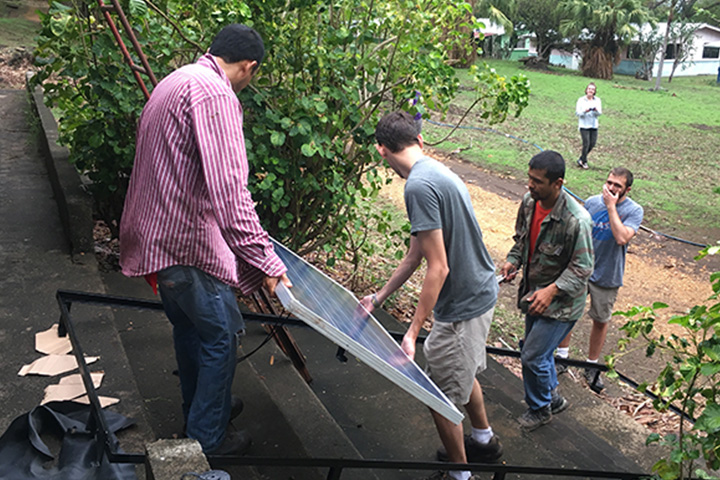Developing a Net-Zero Biological Field Station in Costa Rica
Developing a Net-Zero Biological Field Station in Costa Rica
Developing a Net-Zero Biological Field Station in Costa Rica
Program: Dow Distinguished Awards
All Dow Distinguished Awards projects »

Students assist with installing solar panels at the Taboga Reserve research field station.
Spotlight on Carbon Neutrality

The Taboga Forest Reserve in Costa Rica’s Guanacaste Province, established to conserve the region’s tropical dry forests, was largely abandoned 10 years ago due to funding constraints. U-M now has access to the reserve, and this team created a carbon-neutral energy plan for a research and education center adapted from the conventional biological station already on site. The new net-zero biostation will provide U-M and Costa Rican students and faculty with countless opportunities for sustainability and conservation research, while serving as a model for sustainable and responsible science.
To facilitate interdisciplinary work in environmentalism, a Dow Distinguished Awards student team established a plan for a net-zero carbon research and education center in Costa Rica. This field station brings together scientists and students from the United States and Costa Rica and provides researchers with a place to investigate relevant sustainability and ecological topics. Working with Sustainability Without Borders, the U-M team constructed a thorough energy forecast that included present and desired electricity demand, gathered data on local renewable energy resources, and created a model to determine how energy could be harnessed most efficiently from crop residue. Compiling the data, the team created a blueprint for a microgrid system that will allow the station to become carbon neutral. This project comprises four phases with the first phase slated for completion in April 2020, and the project will be completed by April 2023.
Location: Guanacaste, Costa Rica
Disciplines Represented: Environment, Mathematics, Engineering
Project Team: Jake Picardat, Thomas Hayek, Maya Lapp, and Andrew Harrison (Team Lead)
Faculty Advisor: Jose Alfaro, School for Environment and Sustainability; Thore Bergman, Psychology and Ecology and Evolutionary Biology; Jacinta Beehner, Psychology and Anthropology
Project Client/Sponsor: Sustainability Without Borders